Before Malcolm X went to Africa, he was a Black nationalist and member of the Nation of Islam. By the time he left, he had become a Pan-Africanist, fighting an anti-imperialist struggle. African Stream tells the story of Malcolm X’s political transformation that led to his assassination a few months after his return.
Related Articles
Related Articles

As Sudan’s Army and Rapid Support Forces Battle, Sudanese Left Calls for Restoring the Revolution
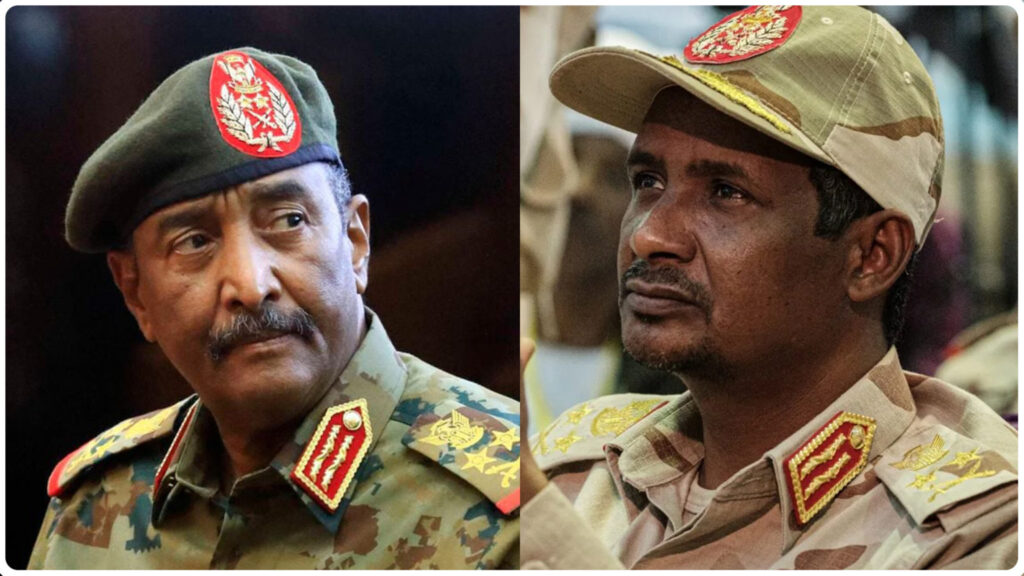
Editor’s Note: This article was originally published by Peoples Dispatch.
Tensions simmering between Sudan’s army and the powerful paramilitary Rapid Support Forces (RSF) boiled over into armed clashes on the morning of Saturday, April 15, following disagreements over the integration of the autonomous RSF into the army’s command chain.
The issue of integration was a key aspect of a deal that Sudan’s ruling junta was to sign with right-wing civilian forces to share power with the latter. The left in Sudan has been critical of the proposed deal, questioning the sincerity of the parties. Speaking to Peoples Dispatch a few hours before the fighting broke out, the Sudanese Communist Party’s Foreign Relations Secretary, Saleh Mahmoud, said “Both the forces, the army and the RSF, have a mutual interest in escalating armed conflict, so that it can be used as a reason to not hand over power to the civilian forces.”
According to the Sudanese Armed Forces (SAF), the air force carried out strikes destroying RSF’s Tiba and Soba base in Khartoum State on Saturday. Heavy gunfire began in the morning in several cities, including in the vicinity of the Presidential Palace and the airport in the capital Khartoum city.
Earlier, the RSF, which is led by the ruling military junta’s deputy chairman, General Mohamed Hamdan Dagalo, aka Hemeti, claimed to have taken control of the Presidential Palace, the seat of the junta’s chairman and army chief, General Abdel Fattah al Burhan.
Later, however, after continued fighting, the SAF claimed that the RSF troops had left their weapons behind and fled the the presidential palace area to hide in the residential areas. The army has called on the residents to stay home.
The RSF had also claimed to have taken control of the airports in Khartoum and in El-Obeid, over 400 km southwest of Khartoum in the state of North Kordofan. It also claimed control over the military airbase in Merowe, 200 km to Khartoum’s north, in the Northern State which borders Egypt.
While Hemeti is backed by the UAE, Egypt, which is said to be backing Burhan in this internal struggle, reportedly has planes in this airbase, making it a crucial infrastructure.
On April 12, at least a hundred RSF vehicles surrounded this airbase. Sudan Tribune reported that “the army surrounded the RSF troops and requested them to evacuate but the paramilitary force refused.” Subsequently, military vehicles of the RSF also rolled into Khartoum and several other cities.
Complaining that “this deployment and repositioning” of the RSF “clearly violates the law,” the SAF spokesperson issued a statement at 3 a.m. on Thursday, warning that the “continuation” of such deployments “will inevitably cause more divisions and tensions that may lead to the collapse of security in the country.”
According to the RSF, which first issued a statement on the fighting, clashes began after a surprise attack by the army on its troops in Soba, before simultaneous attacks on its bases in several other cities. The SAF has in turn accused the RSF of lying to conceal its own aggression.
RSF and the Army Worked Together to Protect Military Rule from Pro-Democracy Movement
Established in 2013, the RSF was formed by coalescing the various militias used by the state during the civil war in Darfur in the 2000s to commit alleged war crimes, crimes against humanity, and genocide.
Omar al-Bashir, the former dictator under whose administration these alleged crimes were committed, stands trial at the International Criminal Court (ICC). He was forced out of power on April 11, 2019, about four months after the start of the pro-democracy protests that have come to be known as the December Revolution.
By the time of his ouster, the RSF had become, and remains, one of the most powerful organizations in the country with a vast financial network built on mining gold in Darfur. Hemeti had pledged over a billion dollars to help stabilize Sudan’s central bank in the aftermath of Bashir’s removal.
Such increasing power and influence of the RSF have been making the army uneasy over the years. Reports about underlying tensions between the Burhan and Hemeti have been frequent. However, united with the intent to maintain military rule and protect it from the December Revolution, the two forces had been working together.
The junta formed by the generals in Bashir’s security committee after his removal was chaired by army chief Burhan, who in turn declared RSF head Hemeti his deputy on April 12, 2019, exactly four years before he would deploy the RSF to surround Merowe military airbase.
When the mass sit-in demonstration occupying the square outside the army HQ continued after Bashir’s removal, insisting on a civilian administration, the junta deployed the RSF on June 3, 2019. In the massacre that followed, RSF troops killed over a hundred protesters, wounding many more and raping several while the army watched over from its HQ.
Right-Wing Parties Seek Compromise with the Military Junta, Again
In the aftermath of this massacre, right-wing parties in the coalition, Forces of Freedom and Change (FFC), entered into negotiations with the junta, forming a joint civilian-military transitional government in August 2019. In protest against this compromise, the Sudanese Communist Party (SCP), a key player in the December Revolution, broke away from the FFC, which was formed in January that year to represent the pro-democracy protest movement.
Under this power-sharing arrangement with the FFC, the military controlled the defense, the police, the foreign policy, and much of Sudan’s economy. The little power that was ceded to the FFC-chosen civilians in this government was taken back with the military coup in October 2021, since when military rule has been absolute.
“No negotiations, No Compromise, No partnership” with the military, is a slogan that has been resonating in the mass-protests that have continued since the coup, regularly drawing hundreds of thousands to the streets in several towns and cities across the country.
Disregarding this popular call for the complete overthrow of the junta and the prosecution of its generals under a fully civilian transitional government, the FFC returned right back to negotiations after the coup, seeking a compromise and partnership with the military again.
The unpopular negotiations were supported by the Trilateral Mechanism, formed by the United Nations Integrated Transition Assistance Mission in Sudan (UNITAMS), African Union (AU), and the seven-countries regional bloc, Intergovernmental Authority on Development (IGAD).
The United States threw its weight behind these negotiations, imposing pressure on the military as well as the right-wing FFC parties to make compromises and come to another power-sharing agreement.
Egypt and Saudi Arabia, which are backing Burhan, and the UAE, which is backing Hemeti, all want a military regime in Sudan, albeit with different hierarchical structures, Fathi Elfadl, national spokesperson of the SCP, told Peoples Dispatch.
“But the Americans,” he added, “have been pushing for a comprehensive agreement with the FFC to establish a civilian authority, which, however, will only serve as a cover for the real authority that will be invested in the Security and Defense Council controlled by the junta.”
Under much Western pressure and growing threats to their authority from the radical mass-movements below, the junta and the FFC signed a Framework Agreement in December 2022, laying the path toward a final political agreement on another power-sharing arrangement.
By then, at least 120 had been killed and thousands injured in the crackdown on pro-democracy protests by the army, the police, and the RSF. Yet, unwilling to compromise with the military, the network of over 5,000 local Resistance Committees (RCs) across Sudan, which have been leading the mass-protests since the coup, rejected the agreement, and vowed to continue mass-actions till the junta is toppled.
Hundreds of more protesters have since suffered injuries in the crackdown that has continued despite the junta’s commitment in the Framework agreement to respect “international human rights charters.. freedoms of peaceful assembly and expression”.
While the agreement stated that a civilian Prime Minister will be the supreme commander of the armed forces, Burhan clarified to media only days later that the “civilian Supreme Commander of the SAF” neither “presides over the army chief” nor appoints him, but “only approves recommendations made to him.”
Despite these demonstrations of bad faith, the FFC proceeded under the aegis of the trilateral mechanism to negotiate the contested issues left unresolved in the framework agreement.
These included the review of the Juba peace agreement which has brought no peace to the war-torn regions like Blue Nile and Darfur where hundreds of thousands have been displaced since in continuing armed attacks, mostly by the RSF and the militias it supports. Another contested issue was the nature of transitional justice for the victims of the June 3 massacre and other atrocities.
With several compromises, the FFC had found common ground with the junta on most of these issues by last month when the signatories of the framework agreement announced that the final political agreement will be signed by April 1. This was to be followed by a constitutional declaration on April 6, and finally, the establishment of the new joint transitional government by April 11, the anniversary of the overthrow of Bashir.
‘Only Way Out of the Crisis Is to Restore the Revolution’
However, on April 1, the signing of the political agreement was postponed to April 6, and then indefinitely delayed. The FFC said that the delay was caused due to a disagreement between the army and the RSF over the integration of the latter into the former’s structure.
While Burhan is insisting that the integration should take place within the two years of the transitional period by the end of which an election is to be held as per the agreement, Hemeti has refused, demanding 10 years.
“By lining up with the RSF in this dispute, the FFC has lost the little credibility they may have been left with after entering into negotiations with the junta for the second time,” SCP’s Foreign Relations Secretary, Saleh Mahmoud, told Peoples Dispatch.
While the FFC has denied the allegation, Middle East Eye reported that according to a draft of the final agreement it has seen, a period of 10 years had been agreed upon for this process of integration. Given that the FFC claims that it is only the disagreement within the security forces that is impeding the final agreement, the provision of 10 years in the draft might be an indication of the FFC’s willingness to allow the notorious paramilitary another decade of autonomy.
One explanation for the alleged siding of the FFC with the RSF is that the RSF agrees with the FFC that parties that have not signed the framework agreement should not be a part of the political agreement or have a share in state power. Burhan, however, has shown his keenness to also include other parties outside the framework agreement, especially those who had been in alliance with the ousted Bashir’s Islamist National Congress Party (NCP).
With the escalation of hostilities, however, the prospect of a final political agreement on the basis of the framework agreement has practically fallen apart, argued Mahmoud.
SCP reiterated in its statement that “the only way to get out of the crisis is to restore the revolution and establish the authority of the people.”
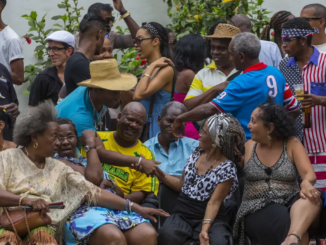
‘Anti-Black’ Claim Raised About Cuba As Solidarity Activists Stopped at U.S. Border & Black Socialists Arraigned in United States for Collaborating with Russia
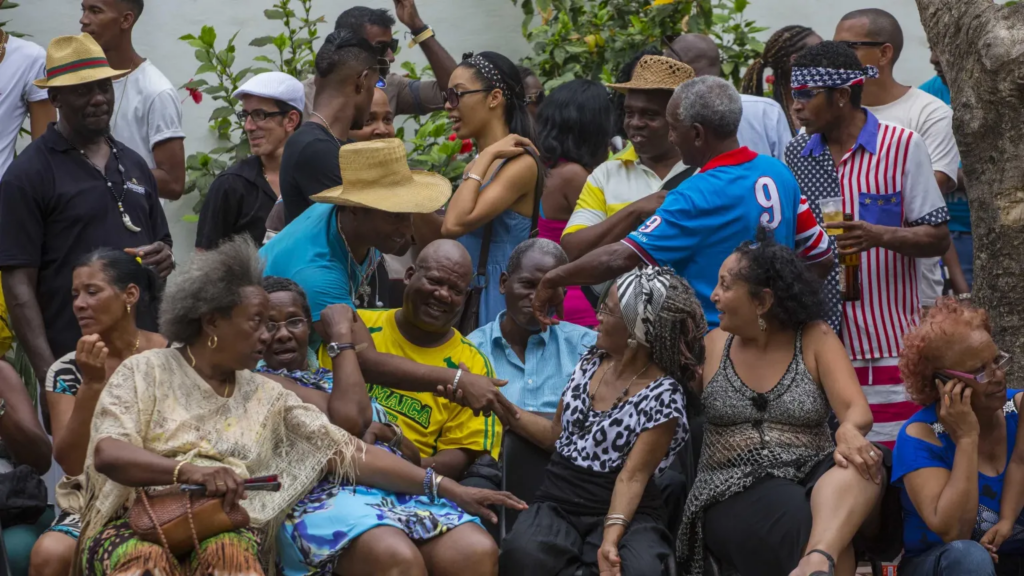
A 2-year-old argument about “anti-Blackness” in Cuba, which Black solidarity activists in the United States say has no basis in reality, has reared its head.
It appeared in a video posted on Twitter on May 1 that has since gone viral, generating more than 2 million views in four days. The video features Afro-Cuban Grecia Ordoñez, who claims Cuban Revolution leaders Fidel Castro and Ernesto “Che” Guevara were racists who engaged in “white saviorism.” She also claimed genocide was committed in the Democratic Republic of Congo during the time Cuba’s revolutionary government intervened to support rebels fighting the DRC government put in place after revolutionary leader and first Prime Minister Patrice Lumumba was assassinated in 1961. Further, she pointed to Afro-Cubans being detained in Cuba as an example of racism.
A message to black Americans from Cubans regarding Che Guevara and Fidel Castro. #Cuba🇨🇺 pic.twitter.com/kHCDnBaE6H
— Martha Bueno (@BuenoForMiami) May 1, 2023
Activists debunked her claims on Twitter, including a thread of articles and videos featuring members of anti-imperialist group Black Alliance for Peace.
For 2 years, the “anti-Blackness” claim has allowed "human rights" narratives to form around revolutionary states in the crosshairs of the U.S. empire. This video comes on the heels of one of the largest U.S. youth delegations to visit #Cuba (@PeoplesForumNYC). Here's a thread 🧵 https://t.co/oV3AhE9V0u
— Black Alliance for Peace (@Blacks4Peace) May 4, 2023
The thread included the following articles and videos:
- Hood Communist Guide to the U.S. Blockade
- Limits of Lived Experience by Erica Caines
- Out of The Clouds: Remarks on Anti- Blackness In Cuba by Salifu Mack
- Witnessing Afro Cubans and Social Change by Austin Cole
- An African Palenque: Cuba And Global Black Solidarity by Kimberly Monroe
- African Power and Politics In Cuba’s La Marina Neighborhood by Musa Springer
- Ajamu Baraka on Cuban Protests
- Afro-Cubans Against Cuba
- Black Alliance For Peace x Belly of The Beast Screening Event
- James Early and Musa Springer on Cuba, Socialism and Race
- Black August and The Cuban Revolution
While Ordoñez doesn’t point to evidence for the claim about genocide in Congo, a 2021 article in the Journal of Cold War Studies states:
“In reality, the main purpose was to crush the rebellion and secure Western interests in Congo. The intervention reflected a cavalier attitude toward sovereignty, international law, and the use of force in postcolonial Africa and had the adverse effect of discrediting humanitarian reasoning as a basis for military intervention until the end of the Cold War. The massacre of tens of thousands of Congolese in Stanleyville was a unique moment in which African countries united in their criticism of Western policies and demanded firmer sovereignty in the postcolonial world.”
Black Activists Reject Claims of Cuba’s Racism
The Black Alliance for Peace released a statement close to two years ago after protests erupted in Cuba over claims of racism. The statement, titled, “Biden’s Commitment to U.S. White Power Is the Real Race Issue in Cuba,” concludes, “We say to all those who pretend to be concerned about Cuba to demand an end to the embargo and to respect the right of the Cuban people to work through their own problems. As the first republic established on the basis of race and subsequently invented apartheid, the United States should be the last on the planet to lecture anyone on race relations.”
Activists like Asantewaa Nkrumah-Ture raised her voice against the claim that Cuba holds Black political prisoners.
“Who are ‘Black political prisoners’ in Cuba? What are their names? What organizations do they belong to & are those organizations independent of [U.S. National Endowment for Democracy] NED and [U.S. Agency for International Development] u.s. AID? Do they belong to [movement of jailed dissidents] Ladies in White? LOL, you sound more & more like Carlos Moore,” Nkrumah-Ture tweeted. Moore is an Afro-Cuban academic who wrote a 1988 book criticizing Cuban leader Fidel Castro as using racist means to grow Cuba’s influence around the world.
Who are "Black political prisoners" in Cuba? What are their names? What organizations do they belong to & are those organizations independent of NED and u.s. AID? Do they belong to Ladies in White? LOL, you sound more & more like Carlos Moore 🇨🇺
— Mawusi Ture (@MawusiTure) May 4, 2023
Further, activist and Ph.D. candidate Kimberly Miller tweeted in reply, “Are the ‘Black political prisoners’ you’re referring to leaders of San Isidro ‘movement,’ like Luis Alcántara or Denis Solís, who admittedly had members ‘who love Trump’ and directly met w/charge d’affaires at U.S. Embassy in Havana to foment regime change??”
are the “Black political prisoners” you’re referring to leaders of San Isidro ‘movement’ like Luis Alcántara or Denis Solís who admittedly had members “who love Trump” and directly met w/chargé de affaires at US Embassy in Havana to foment regime change?? https://t.co/NUpR919H9X
— Kimberly-Dawn 🇸🇩 (@ComradeKimDawn) May 5, 2023
U.S. Solidarity Activists Detained After Visit to Cuba
Meanwhile, Ordoñez’s viral video came just as the largest solidarity delegation in recent history commemorated May Day or International Workers’ Day, alongside 100,000 Havana residents representing many sectors of work. Last year’s parade drew 700,000 Cubans in Havana, as well as thousands of people who celebrated across the island. However, this year, the more-than-60-year-old U.S. blockade on Cuba has caused fuel shortages that required Cuba to cancel the parade itself and instead organize events in Havana’s neighborhoods, as Musa Springer reported on Radio Sputnik’s “By Any Means Necessary,” co-hosted by TF Board Secretary Jacqueline Luqman.
“Cubans say they are in a second Special Period,” Springer said, referring to the first Special Period that occurred after the Soviet Union dissolved in 1991, thereby causing drastic shortages of food, fuel and machinery in the 1990s. Cuba’s gross domestic product thus dropped by 35 percent in three years.
More than 1,000 foreigners from 58 countries, all representing 271 youth, labor, social and political organizations traveled into Cuba this year for the parade, as well as for an annual conference held the next day. The delegation, led by People’s Forum in New York City, included between 300 and 350 U.S.-based activists, including many young people who had never been to Cuba before. The People’s Forum tweeted that their delegation faced a second questioning behind closed doors upon their return to U.S. airports and that their digital devices had been confiscated for searches.
Upon arrival to U.S. airports, U.S. citizens and non-citizens usually line up at booths to be questioned by U.S. Customs and Border Patrol officers. Most people are allowed to continue into the United States after answering a few questions about the reason for their journey abroad. Any reason can provoke a second questioning in private, which can extend a traveler’s time inside the airport by hours.
Activist Bill Hackwell wrote in Resumen Latinoamerica English that both members of the International Peoples Assembly delegation and the LA US Hands Off Cuba Committee delegation faced a second round of interrogations, as well as device confiscations. At the time of his writing, members in those delegations had been freed.
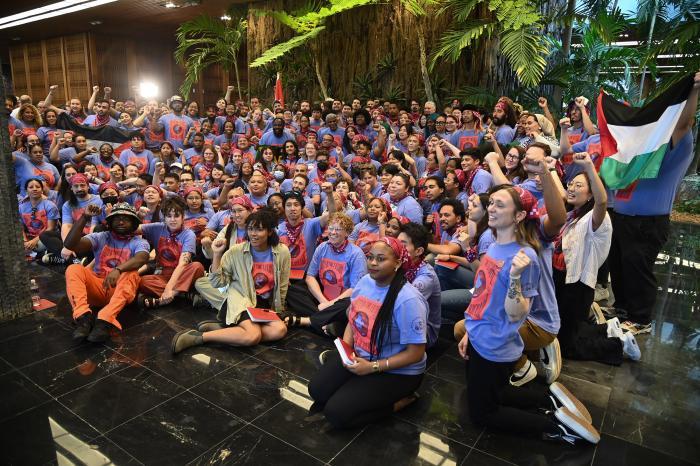
Hackwell commented on the irony by remarking on his experience in Cuba.
“What I have seen this past week is a government here more concerned about the well-being of the next generation of U.S. youth than their own government that marginalizes them by constricting access to jobs with a living wage, that makes access to education nearly impossible without the burden of student loans that they will carry for years, and that incarcerates them at a rate like no other country in the world.”
Manolo De Los Santos, executive director of the People’s Forum, thanked the Cuban people for their solidarity.
“These unfortunate incidents are further evidence of the wrong direction of a hostile U.S. foreign policy towards Cuba,” De Los Santos concluded in the tweet. “Their actions in fact demonstrate that the U.S. is far from a bastion of democracy and human rights, and rather than intimidate us, they motivate us to strengthen our struggles for true, transformative change here in the United States.”
🇨🇺✊🏽 After hours of harassment & interrogation, all the comrades who traveled to Cuba are FREE! Thanks for all the love & solidarity received from throughout the world!!
The aggressive attitude of the Customs & Border Patrol officials towards the members of our delegation during…
— Manolo De Los Santos (@manolo_realengo) May 4, 2023
Cuban President Miguel Díaz-Canel Bermúdez expressed his solidarity with the detained activists.
“Cheer up guys, we’re with you. Thank you for your courage, for supporting #Cuba and for facing the hatred of those who cannot stand the fact that the Cuban Revolution has the support of the most progressive youth in the very bowels of the beast. We send you a big hug.”
Ánimo, muchachos, estamos con ustedes. Gracias por la valentía, por apoyar a #Cuba y por enfrentar en las propias entrañas del monstruo el odio de quienes no pueden soportar que la Revolución Cubana tenga el apoyo de los jóvenes más progresistas. Les mandamos un fuerte abrazo. https://t.co/N6K2H92CaX
— Miguel Díaz-Canel Bermúdez (@DiazCanelB) May 4, 2023
U.S. Government Attacks Black Socialists
Meanwhile, the Hands Off Uhuru campaign announced via email to the press that on Tuesday, May 2, African People’s Socialist Party Chairman Omali Yeshitela and African People’s Solidarity Committee Chairwoman Penny Hess appeared in federal court in Tampa, Florida, in response to the U.S. Dept. of Justice’s April 18 indictment. The Black socialist group is accused of allegedly attempting to “sow discord” in the United States with the support of Russia.
Yeshitela, an 81-year-old Black man, and Hess, a white woman active in the movement since 1976, were “booked, restrained with handcuffs and leg irons, and held in a cell for several hours before appearing before a judge who released them on conditional bond that included a requirement to hand over their passports.
On Monday, May 8, Uhuru Solidarity Movement Chair Jesse Nevel will appear in response to the same indictment.
The group has asked the public to donate to the “Hands Off Uhuru! Hands Off Africa! Defense Fund” to help cover their legal fees.
Background information about this indictment can be found in a recent Toward Freedom article. If found guilty, the accused face up to 15 years in prison.
Julie Varughese is editor of Toward Freedom.
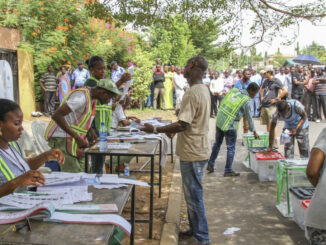
Buhari Warns About Foreign Meddling As Nigeria Heads to Polls to Decide on Next President
Nigeria’s president has scolded Western diplomats for their comments about the way the February 25 presidential election is being run, warning against foreign meddling. Countries across Africa are up against Western-backed coup attempts and Western-supported disinformation campaigns. African Stream reports.
